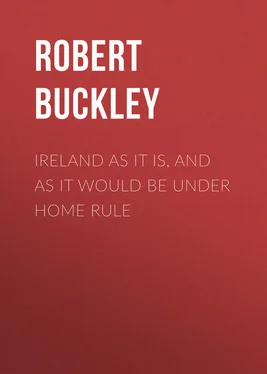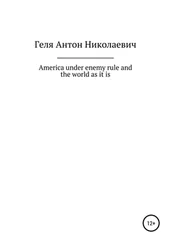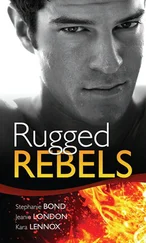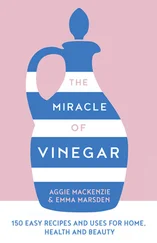Robert Buckley - Ireland as It Is, and as It Would Be Under Home Rule
Здесь есть возможность читать онлайн «Robert Buckley - Ireland as It Is, and as It Would Be Under Home Rule» — ознакомительный отрывок электронной книги совершенно бесплатно, а после прочтения отрывка купить полную версию. В некоторых случаях можно слушать аудио, скачать через торрент в формате fb2 и присутствует краткое содержание. ISBN: , Жанр: foreign_antique, foreign_prose, на английском языке. Описание произведения, (предисловие) а так же отзывы посетителей доступны на портале библиотеки ЛибКат.
- Название:Ireland as It Is, and as It Would Be Under Home Rule
- Автор:
- Жанр:
- Год:неизвестен
- ISBN:http://www.gutenberg.org/ebooks/29710
- Рейтинг книги:5 / 5. Голосов: 1
-
Избранное:Добавить в избранное
- Отзывы:
-
Ваша оценка:
- 100
- 1
- 2
- 3
- 4
- 5
Ireland as It Is, and as It Would Be Under Home Rule: краткое содержание, описание и аннотация
Предлагаем к чтению аннотацию, описание, краткое содержание или предисловие (зависит от того, что написал сам автор книги «Ireland as It Is, and as It Would Be Under Home Rule»). Если вы не нашли необходимую информацию о книге — напишите в комментариях, мы постараемся отыскать её.
Ireland as It Is, and as It Would Be Under Home Rule — читать онлайн ознакомительный отрывок
Ниже представлен текст книги, разбитый по страницам. Система сохранения места последней прочитанной страницы, позволяет с удобством читать онлайн бесплатно книгу «Ireland as It Is, and as It Would Be Under Home Rule», без необходимости каждый раз заново искать на чём Вы остановились. Поставьте закладку, и сможете в любой момент перейти на страницу, на которой закончили чтение.
Интервал:
Закладка:
Every self-respecting Saxon visitor to Cork visits the famous castle of Blarney, seven miles away, to see the scenery and kiss the Blarney Stone, the apparent source of Home Rule inspiration.
There is a stone there
That whoever kisses
Och! he never misses
To grow eloquent.
'Tis he may clamber
To a lady's chamber,
Or become a member
Of Parliament.
A clever spouter
He'll sure turn out, or
An out-an'-outer
To be let alone!
Don't hope to hindher him
Or to bewildher him —
Sure, he's a pilgrim
From the Blarney stone!
The walk is delightful, not unlike that from Colwyn Bay to Conway, but more beautiful still, as instead of the London and North Western Railway a lovely river runs along the valley on your right. The Cork and Muskerry Light Railway occupies the roadside for the first four miles, relic of the beneficent Balfour – winding by the river side for the rest of the journey, through fat meadows dotted with thriving kine, and having a background of richly-wooded hills. At Carrickrohane your left is bounded by a huge precipitous rock, covered from base to summit with ivy and other greenery, a great grey building on the very brink of the abyss, flanked by Scotch firs, peering over the precipice. A fine stone bridge, garrisoned by salmon-fishers, leads to the Anglers' Rest, and here I found a splendid character, one Dennis Mulcahy, who boasted of his successful resistance to the Land League. Having told me of his adventures in America, and how his oyster-bar experiences in the Far West had opened his eyes to the fact that the Irish people were being humbugged, he narrated his return to his native land, on his succession to a small farm left him by "an ould aunt he had." His language was so forcible and picturesque that I despair of conveying its effect, more especially as no pen can describe the rich brogue, which, notwithstanding his two years' residence in the States, was still thick enough to be cut with a knife. Apart from its amusing side, his story has a moral, and may be instructively applied.
"'Twas at Ballina I was, the toime o' the Land Lague. 'Twas there Captain Moonlight started from, an' the whole disthrict was shiverin' in their shoes. I refused to subscribe to the Land Lague, an' they started to compil me, but, be the powers, they tackled the wrong tom-cat whin they wint to coarce Dennis Mulcahy. Threatenin' letthers, wid pictures o' death's-heads, an' guns, an' pikes, an' coffins, was but a thrifle to the way they wint on. But they knew I had a thrifle of a sivin-shooter, an' bad luck to the one o' thim that dared mislist me at all. At last it got abroad that I was to get a batin' wid blackthorn sticks, for they wor tired the life out o' them, raisonin' wid me. Well, says I, I'm here, says I, an' the first man that raises a hand to me, I'll invite him to his own inquist, says I, for, bedad, I'll perforate him like a riddle, says I. Well, it wint on an' on, till one day I was stayin' at a bit of a shebeen outside the place, when a slip o' a girleen kem to me – I was sittin' on a bench in the back garden, the way I'd enjoy my pipe in the fresh air, an', says she, 'Get out o' this, for there's a whole crew o' thim inside going to bate you.' That was six or seven o' a fine summer's night, an' I walked into the house an' took a look at thim – a thievin' heap o' blayguards as iver ye seen wid your two eyes."
"I wint out again an' sat in the haggard, where I could kape my eye on the dure. Prisintly out comes one o' thim, to commince the row, I suppose.
"He spoke o' the Land Lague, an' I towld him I didn't agree wid it at all, and 'twas a thievin' invintion o' a set o' roguish schamers.
"'Ye'd betther mind yer manners,' says he, 'onless ye have yer revalver,' says he, lookin' at me maningly.
"Faix, 'tis here, says I, pullin' out the tool.
"'But can ye handle it?' says he.
"Begorra, says I, I'd shoot a fly off yer nose; an' wid that I looked round for a mark, an' I seen in a three foreninst me a lump o' a crow sittin' annoyin' me. 'Will ye quit yer dhrimandhru?' says I, to the botherin' ould rook.
"'Caw, caw, caw,' says he, vexin' me intirely.
"Bang! says I, an the dirty blackburd comes fluttherin' down, an' dhropped in the haggard like a log o' limestone.
"Ye should have seen that fellow! The landlord wid the whole rout o' thim runs out. 'What's the matter?' says he, starin' round like a sick cod-fish.
"'I'm afther charmin' a burd out iv a three; 'tis a way I have,' says I, shovin' in a fresh cartridge from my waistcoat pocket, fair an' aisy, an' kapin' me back to the haystack.
"'Was it you kilt the jackdaw?' says he.
"''Twas meself,' says I, 'that did it,' says I.
"'An' ye carry a murdherin' thing like that in a paceful counthry,' says he. ''Tis yer American thrainin' says he, sneerin'.
"I tuk off me hat an' giv' him a bow an' a scrape. 'Is it yerself would insinse me into the rudiments o' polite larnin'?' says I. Thin I looked him straight into the white iv his eye, an' give him the length o' my tongue. Me blood was up whin I seen this spalpeen wid his dirty set o' vagabones waitin' to murther me if they ketched me unbeknownst. 'Michael Hegarty,' says I, 'where did ye scour up yer thievin' set o' rag-heaps?' says I. 'Ye'd bate me wid blackthorns, would ye? Come on, you and your dirty thribe, till I put sivin shots into yez. Shure I could pick the eye out o' yez shure I could shoot a louse off yer ear,' says I. 'Anger me,' says I, 'an' I'll murther the whole parish; raise a stick to me, an' I'll shlaughter the whole counthry side.' An' wid that I cocked me little shootin'-iron.
"Ye should have seen that shebeen-keeper; ye should have seen the whole o' them whin I raised me voice an' lifted me little Colt!
"They tumbled away through the dure, crossin' each other like threes ye'd cut down, lavin' the landlord, struck all iv a heap, the mug on him white as a new twelve-pinny, staggerin' on his two shin-bones, an' thrimblin' an' shiverin' wid fright, till ye'd think he'd shake the teeth out iv his head.
"The murdherin' vilyans want shtandin' up to, an' they'll rispict ye. I had no further trouble. That was the last o' thim. 'Tis the wake an' difinceless people they bate an' murther. I heerd there was talk o' shootin' me from the back iv a ditch; an' that one said, 'But av ye missed?' says he. 'What thin?' says he.
"Ye should sind ould Gladstone an' Morley an' the other ould women to Carrignaheela till I give them a noggin' o' right poteen an' insinse thim into the way iv it. The only way o' managin' me counthrymin is to be the masther all out, an' 'tis thrue what I spake, an' sorra one o' me cares who hears me opinion. I'm the only man in the counthry that dares open his teeth, an' yet they all thrate me well now, an' the priest invites me to his house. An' all because I spake me mind, an' don't care three thraneens for the whole o' thim. 'Twas in America I larned the secret."
Cork, April 20th.
No. 11. – THE CRY FOR PEACE AND QUIETNESS
What's the next place to this?" I asked, as the Southern and Western Railway deposited me at Tralee. I was uncertain as to whether the place was a terminus, but the gintleman who dhrove the cyar I hailed marvelled greatly at my ignorance. He surveyed me from top to toe with a compassionate expression. No doubt he had heard much of the ignorance of the uncivilised English, but this beat the record. Not to know that Tralee was on the sea, not to know that the little port frowned o'er the wild Atlantic main, as Mr. Micawber would have said. He struggled for a moment with his emotion and then said,
"Musha, the next parish is Amerikay!"
I apologised for my imperfect geographical knowledge, but the cyar-man was immovable. No pardoning look stole over his big red face, which was of the size and complexion of a newly cut ham. Nor would he enter into conversation with the inquiring stranger. He cursed his horse with a copiousness which showed his power of imagination, and with a minute attention to detail which demonstrated a superior business capacity. Put him in the House amongst the Nationalist members, and he is bound to come to the front. The qualifications above-mentioned cannot fail to ensure success. We have the examples before us, no need to mention names. A hard cheek, a bitter tongue, and a good digestion are the three great steps in the Irish Parliamentary gradus ad Parnassum , the cheek to enable its happy possessor to "snub up" to gentlemen of birth and breeding, the tongue to drip gall and venom on all and sundry, the digestion to eat dirt ad libitum and to endure hebdomadal horsewhippings. Such a man, I am sure, was the dhriver of my cyar, who may readily be identified. His physiognomy is very like the railway map of Ireland, coloured red, with the rivers and mountain ranges in dark-blue or plum-colour. As a means of ready reference he would be invaluable in the House of Commons. How interesting to see Mr. Gladstone poring over his cheek (Connaught and Leinster), his jaw (Munster, with a pimple for Parnellite Cork), and his forehead (Ulster, with the eyes for Derry and Belfast). The G.O.M. would find the Kerry member invaluable. Like the rest he would probably be devoid of shame, untroubled by scruples, and a straight voter for his side, so long as he was not allowed to go "widout a male." Who knows but that, like the Prime Minister's chief Irish adviser, he may even have been reared on the savoury tripe and the succulent "drischeen"?
Читать дальшеИнтервал:
Закладка:
Похожие книги на «Ireland as It Is, and as It Would Be Under Home Rule»
Представляем Вашему вниманию похожие книги на «Ireland as It Is, and as It Would Be Under Home Rule» списком для выбора. Мы отобрали схожую по названию и смыслу литературу в надежде предоставить читателям больше вариантов отыскать новые, интересные, ещё непрочитанные произведения.
Обсуждение, отзывы о книге «Ireland as It Is, and as It Would Be Under Home Rule» и просто собственные мнения читателей. Оставьте ваши комментарии, напишите, что Вы думаете о произведении, его смысле или главных героях. Укажите что конкретно понравилось, а что нет, и почему Вы так считаете.












